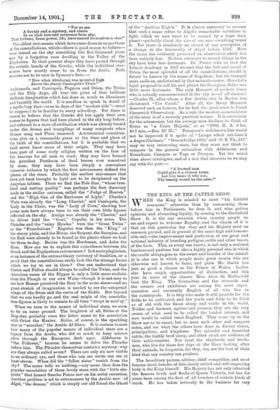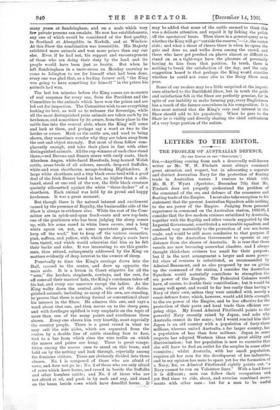THE KING AT THE CATTLE SHOW.
NvHEN the King is minded to meet "his faithful commons" otherwise than by summoning them before him in Parliament, he does it, and wins golden opinions and abounding loyalty, by coming to the Smithfield Show. It is the one occasion when country people do see and expect to welcome Royalty, and the charm of it is that on this particular day they and his Majesty meet on common ground, and in pursuit of the same high and honour- able end,—the improvement and perfection of our great and national industry of breeding pedigree cattle and other beasts of the farm. This, as every one knows, is not only a national business and pastime, but also a highly personal one, in which the credit always goes to the owner and breeder of the animal. It is also one in which people make great names who are otherwise not known to fame, and plain Mr. Smith has just as good a chance as the Prince of Wales. Ladies also have ample opportunities of distinction, and this year in some of the classes Miss Alice de Rothschild beat the King. The Committee and the stewards and the owners and exhibitors are among the most repre- sentative and eminently English of all who live in the countryside. It is they who make it still possible for the fields to be cultivated, and the yards and folds to be filled as of old with the finest sheep and cattle in the world. Nobles and farmers, squires and yeomen, they are the very cream of what used to be called the landed interest, and now would be called rural England. They come up to the Show not to be smart, but to meet each other and compare notes, and see what the others have done in distant shires, principalities, and kingdoms. The splendid and beautiful cattle, the highly bred sheep, and other stock are evidence of their achievements. Nor must the shepherds and herds- men, who live for these few days at the Show looking after their animals, be forgotten, for they, too, are the hest of their kind that any country can produce.
The hereditary patron, adviser, chief competitor, and most famous stock-breeder of this closely united and self-respecting body is the King himself. His Majesty has not only inherited the famous herds and flocks of Queen Victoria, but has for years been among the first of all breeders of certain kinds of stock. He has taken seriously to the business for very
many years at Sandringham, and on a scale which very few private persons can emulate. He now has establishments, any one of which would be considered of the first quality, in Scotland at Abergeldie, in Norfolk, and at Windsor. At this Show the combination was irresistible. His Majesty exhibited more animals and won more prizes than any one else. Even if he had not, his support and encouragement of those who are doing their duty by the land and its people would have been just as hearty. But when he left Sandringham in a snow-storm on Monday morning to come to Islington to see for himself what had been done, every one was glad that, as a leading farmer said, "the King was going to have something for himself" in the prizes his linimals had won.
The last ten minutes before the King comes are moments of real suspense for every one, from the President and the Committee to the animals which have won the prizes and are led out for inspection. The Committee wish to see everything looking its best, as well as to welcome the Sovereign, while all the most distinguished prize animals are taken each by its herdsman, and sometimes by its owner, from their place in the cattle line into the central aisle, where the King will come and look at them, and perhaps say a word or two to the herder or owner. Meek as the cattle are, and used to being shown, they sometimes wonder why they are taken away from the rest and object strongly. But most of them follow com- placently enough, and take their place in line with other distinguished animals. All the cup-winners of each class stand there,—red Devons and Sussex steers with curly coats, black Aberdeen Angus, white-faced Herefords, long-horned Welsh cattle, cross-breds of all colours, smooth, deep-red Suffolks, white and roan shorthorns, savage-looking Highlanders. A large white shorthorn and a tiny black cross-bred with a good deal of the Irish Dexter breed in her, no higher than a side. board, stood at one end of the row, the little black creature quaintly silhouetted against the white " three-decker " of a shorthorn. Each animal was held by its proud and happy herdsman. It was a great moment.
But though there is the natural interest and excitement caused by the presence of Royalty, the businesslike side of the Show is always in evidence also. While the rest of the Com- mittee are in spick-and-span frock-coats and new top-hats, one of the gentlemen who has been judging the sheep comes up, with his arms cased in white linen covers, and a long white apron on, not, as some spectators guessed, "to keep off the wool," but to keep off the various cosmetics, pink, saffron, and yellow, with which the sheep's coats have been tinted, and which would otherwise tint him as he felt their backs and sides. It was interesting to see this gentle- man, thus attired, subsequently addressed by the King on matters evidently of deep interest to the owners of sheep.
Punctually to time the King's carriage drove into the Hall, crossed to the centre, and drew up opposite the main aisle. It is a lesson in Court etiquette for all the "men," the herders, shepherds, cowboys, and the rest, for off come all their masters' hats, the King's coachman takes of his hat, and every one uncovers except the ladies. As the King walks down the central aisle, where all the distin- guished animals, including so many of his own, are standing, he proves that there is nothing formal or conventional about his interest in the Show. He admires this one, and says a word about that one, and then moves on to the sheep pens, and with forefinger uplifted is very emphatic on the topic of more than one of the many points and excellences there shown. Every one cheers him very heartily, most especially the country people. There is a great crowd in what we may call the side aisles, which are separated from the centre by a double line of cattle standing face to face, tied to a bar from which rises the wire trellis on which the names and prizes are hung. There is great compe- tition among the nearer ones to stand on this beam, and hold on by the netting and look through, especially among the feminine visitors. These are obviously divided into three classes. No. 1 is composed of those who are afraid of cows, and dare not go in ; No. 2 of those who are only afraid of cows which have horns, and crowd in beside the Suffolks and other hornless cattle ; and No. 3 of those who are not afraid at all, and push in by each and any, and stand on the beam beside cows which have dreadful horns. It
may be added that some of the cattle seemed to think this was a delicate attention, and repaid it by licking the polish off the spectators' boots. Then there is a general query as to whether the King will go "outside the reserve,"—i.e., the centre aisle; and what a shout of cheers there is when he opens the gate and does so, and walks down among the crowd, and those who have got perched on places almost as difficult to stand on as a tight-rope have the pleasure of personally bowing to him from that position. In truth, there is nothing to break the satisfaction of the day, and the only suggestion heard is that perhaps the King would consider whether he could not come also to the Dairy Show next year.
Some of our readers may be a little surprised at the import- ance attached to the Smithfield Show, but in truth the pride and satisfaction felt in the Show are perfectly genuine, for in spite of our inability to make farming pay, every Englishman has a touch of the farmer somewhere in his composition. It is thus most natural that the King's very real interest in the Show should add to his popularity. When he goes to the Show he is visibly and directly sharing the chief enthusiasm of a very large portion of the nation.















































 Previous page
Previous page